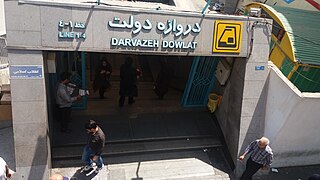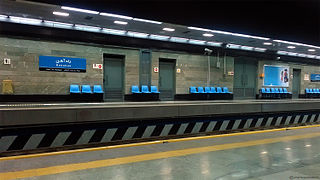
The Grand Bazaar in Tehran, Iran, is split into several corridors that are over 10 kilometres (6.2 mi) in length, each specializing in different types of goods. It has several entrances, with Sabze Meydan being the main entrance.

Tehran Metro is a rapid transit system serving Tehran, the capital of Iran. It is the largest metro system in the Middle East. The system is owned and operated by Tehran Urban and Suburban Railway. It consists of six operational metro lines, with construction under way on seven lines including northwestern extension of line 4, south extension line 6, northwestern and east extension line 7, east extension line 2 and Line 10, Line 8 and 9.
Omar Khayyam (1048-1131) was a Persian poet, mathematician, philosopher and astronomer.

City Park, with its 26 hectares, is an urban park located in central Tehran, Iran. It is the first public park in Tehran. City Park is surrounded by Fayaz Bakhsh Street from the north, Hafez Street from the west, Behesht Street from the south and Khayyam Street from the east.

The demonstrations of June 5 and 6, also called the events of June 1963 or the 15 Khordad uprising, were protests in Iran against the arrest of Ruhollah Khomeini after his denouncement of Iranian Shah Mohammad Reza Pahlavi and Israel. The Shah's regime was taken by surprise by the massive public demonstrations of support, and although these were crushed within days by the police and military, the events established the importance and power of (Shia) religious opposition to the Shah, and Imam Khomeini as a major political and religious leader. Fifteen years later, Khomeini led the Iranian Revolution which overthrew the Shah and the Pahlavi dynasty and established the Islamic Republic of Iran.
Meydan-e Mohammadiyeh Metro Station is a station in Tehran Metro Line 1 and Line 7. It is located in Mohammadiyeh Square, junction of Khayam Street and Molavi Street. The station was known as Molavi Metro Station until May 23, 2017.
Khayyam Metro Station is a station in Tehran Metro Line 1. It is located in Khayyam Street. It is between Meydan-e Mohammadiyeh Metro Station and Panzdah-e-Khordad Metro Station. The station provides access to Tehran Grand Bazar.

The Emam Khomeini Metro Station is the junction of Tehran Metro Line 1 and Line 2. The station was opened on 21 February 2000, it is located in Toopkhaneh Square between Panzdah-e-Khordad Metro Station and Saadi Metro Station in Line 1 and Mellat Metro Station and Hasan Abad Metro Station in Line 2.

Darvazeh Dowlat Metro Station is the junction of Tehran Metro Line 1 and Tehran Metro Line 4. It is located in the junction of Enghelab Street, Saadi Street and Dr. Mofatteh Street. It is between Panzdah-e-Khordad Metro Station and Saadi Metro Station in Line 1 and Mellat Metro Station and Hasan Abad Metro Station. This station is a crowded station because it has connections to Tarbiat Modares University, Ferdowsi Shoe Bazar, Enghelab Book Bazar and Tehran Bus BRT1.

Baharestan Metro Station is a station in Tehran Metro Line 2. It is located in Baharestan Square near Majlis of Iran, and between Darvaze Shemiran Metro Station and Mellat Metro Station.

Mahallati Expressway(Persian: بزرگراه محلّاتی) is an expressway in southeastern Tehran. It is from the east end of Panzdah-e-Khordad Street to Basij Mostazafin Expressway.

Line 4 is one of several lines of the Tehran Metro. The line is 24.4 km (15.2 mi) with 20 main stations, 3 stations along a domestic airport-serving branch line and a terminal (depôt).
Paramount Crossroads, also known as 15 Khordad Crossroads, is a major intersection in a heavily traveled and central area in Shiraz, Iran. It is the junction of Enqelab-e Eslami Street, Lotfali Khan Street and Qasrodasht Street. There is a fuel station docked on the intersection and Zaytoon Shopping Center is in the immediate area. The junction is often used as an assembly point for protests.

Tajrish Metro Station is the northern terminus station of Tehran Metro Line 1. It is also the northernmost Tehran Metro station. It is located in the area called Tajrish, district 1 municipality in northern Tehran, Iran. The station is located at Qods Square, in the northernmost section of Shariati Street. It has an area of 150,000 sq.m with 16 escalators and 8 elevators. The Tajrish Metro Station was inaugurated on 19 February 2012.
Panzdah-e Khordad is a village in Lumar Rural District, Central District, Sirvan County, Ilam Province, Iran. At the 2006 census, its population was 178, in 33 families. The village is populated by Kurds.

Rahahan Metro Station is a metro station in line3 of Tehran metro, located in Rahahan Square. As suggested by the name, it is connected with Tehran Railway Station
Moniriyeh Metro Station is a station in line 3 of the Tehran Metro. It is located in Moniriyeh Square.

The 20 June 1981 Iranian protests, also known as the 30 Khordad protests, was a one-day anti–Islamic Republic protest organized by the People's Mujahedin of Iran on 20 June 1981 in various Iranian cities in response to the impeachment of the then president Abolhassan Banisadr.

The Khordad 15 is an Iranian designed and built surface-to-air missile (SAM) system. The system was unveiled to the public on 9 June 2019 in an address made by Iranian Defence Minister Amir Hatami in Tehran, Iran. The system was developed by the Iran Aviation Industries Organization (IAIO). It has the capability to detect and intercept fighter jets, stealth targets, unmanned combat aerial vehicles (UCAV) and cruise missiles. It operates in conjunction with Sayyad-3 missiles. The surface-to-air missile system was developed in order to counter missiles and other aerial threats presented by the presence of extra-regional forces at military bases in countries around Iran. It was unveiled amid escalating tensions with the United States and Europe's failing attempts at upholding its commitments to the 2015 Iran nuclear deal.
The 15 Khordad Foundation is one of the organizations created in Iran in 1982 on orders of Imam Ruhollah Khomeini that intend to fix the economic issues of the families of martyrs, veterans, and founders of the Iranian Revolution. This foundation is one of the Revolutionary Institutions of the Islamic Republic of Iran and is under the supervision of the Office of the Supreme Leader.













